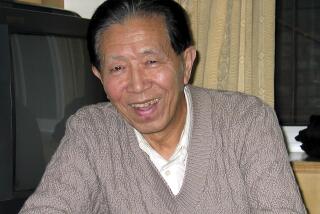China to Honor Reform-Leaning Deposed Official
- Share via
BEIJING — China announced plans Tuesday to commemorate the 90th anniversary of the birth of deposed leader Hu Yaobang, a relatively open-minded official whose death sparked the 1989 Tiananmen pro-democracy protests.
Analysts and Communist Party members cautioned, however, that this decision should in no way be considered a step toward reevaluating the violent crackdown 16 years ago, which defined a generation and soured China’s relations with the outside world.
Rather, they said, this move reflects a course adjustment by Chinese President Hu Jintao. He hopes to soften his image somewhat, they said, after years of cracking down on the media, nongovernmental groups, disgruntled farmers and others who threaten the Communist Party’s monopoly on power.
Hu Yaobang, former secretary general of the party’s powerful Central Committee, may best be remembered by ordinary Chinese for rehabilitating an estimated 3 million people from 1977 to 1982 who had been charged in “unjust, false or wrongful cases” since the early 1950s.
Hu Yaobang was studious, open-minded and a strong believer in equality and democracy, said Ruan Ming, who lives in Taiwan but was his aide from 1977 to 1982 at the Party School in Beijing. Hu also was a voracious consumer of foreign ideas, including Shakespeare’s plays as well as serious philosophical tracts.
“The Chinese Communist Party was afraid of him,” Ruan said. “Why, after more than a decade, do they suddenly decide to commemorate him? They’re trying to dupe the common people, who want more rights and freedom. It’s as phony as their recent white paper on democracy.”
Beijing’s partial embrace of Hu Yaobang doesn’t require enormous political courage, analysts said. He was well liked, and most older-generation party critics are now retired or dead.
And although his death sparked democratic protests in April 1989, he never openly challenged the party line, in contrast with deposed Premier Zhao Ziyang.
“This is a typical balancing move by Hu Jintao, an astute politician,” said Minxin Pei, China director with the Carnegie Endowment for International Peace in Washington. “He’s become aware his image at home and abroad is dented by the perception that he’s an unreconstructed hard-liner.”
The government released a lengthy document last month arguing that it was making progress and that its single-party state was a form of democracy.
The next 18 months will be an important time for Hu Jintao and Premier Wen Jiabao in further consolidating their power. And they may need support from long-standing Hu Yaobang supporters.
“Hu Yaobang is not being remembered so much for personal reasons, since he and Hu Jintao were not as close as some believe,” said He Husheng, professor of party history at Beijing’s Renmin University. “It’s because he was an upright party member and represents a spirit of reform.”
After Mao Tse-tung’s death in 1976, China initially followed a “two whatevers” policy, namely that whatever Mao said was right, and whatever he advocated Chinese should follow.
Hu Yaobang shepherded an important article into the May 10, 1978, Guangming Daily that challenged this view, arguing that pragmatism, not Mao’s utterances, must shape the future.
It was a courageous move. Deng Xiaoping, then vice chairman of the Central Committee, waited a few weeks to assess the political winds before lending his support. China’s instrumental reform policy followed.
Several years later, though, Deng turned against Hu Yaobang, arguing he had become too indulgent.
Hu was fired in 1987 as party secretary.
More to Read
Sign up for Essential California
The most important California stories and recommendations in your inbox every morning.
You may occasionally receive promotional content from the Los Angeles Times.










